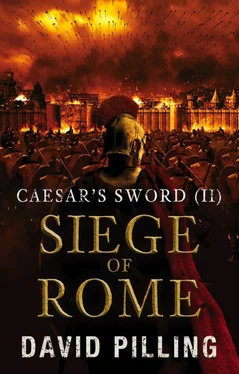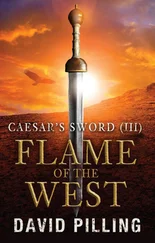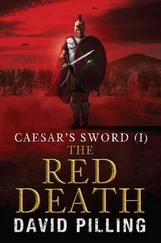David Pilling - Siege of Rome
Здесь есть возможность читать онлайн «David Pilling - Siege of Rome» весь текст электронной книги совершенно бесплатно (целиком полную версию без сокращений). В некоторых случаях можно слушать аудио, скачать через торрент в формате fb2 и присутствует краткое содержание. Год выпуска: 2013, Жанр: Исторические приключения, на английском языке. Описание произведения, (предисловие) а так же отзывы посетителей доступны на портале библиотеки ЛибКат.
- Название:Siege of Rome
- Автор:
- Жанр:
- Год:2013
- ISBN:нет данных
- Рейтинг книги:3 / 5. Голосов: 1
-
Избранное:Добавить в избранное
- Отзывы:
-
Ваша оценка:
- 60
- 1
- 2
- 3
- 4
- 5
Siege of Rome: краткое содержание, описание и аннотация
Предлагаем к чтению аннотацию, описание, краткое содержание или предисловие (зависит от того, что написал сам автор книги «Siege of Rome»). Если вы не нашли необходимую информацию о книге — напишите в комментариях, мы постараемся отыскать её.
Siege of Rome — читать онлайн бесплатно полную книгу (весь текст) целиком
Ниже представлен текст книги, разбитый по страницам. Система сохранения места последней прочитанной страницы, позволяет с удобством читать онлайн бесплатно книгу «Siege of Rome», без необходимости каждый раз заново искать на чём Вы остановились. Поставьте закладку, и сможете в любой момент перейти на страницу, на которой закончили чтение.
Интервал:
Закладка:
I winced again. Britannicus Minor was Theodora’s mocking pet name for me, bestowed when I was a youth training to be a charioteer in the Hippodrome, and she a common dancer and prostitute. I hated it, but the name became popular when I started racing in the arena.
My mind was still clouded with the lingering effect of opium, and it hurt to form words. “A dead hero, sir,” I mumbled, “if I stay in the city.”
Belisarius’ long face was naturally suited to looking grave. He nodded somberly and lowered his bony rump onto the stool beside my bed.
“My guards have already slain two of Theodora’s assassins,” he said, “they grow bolder every day. One of them posed as a seller of rare herbs and medicines. He might have passed through if my men hadn’t insisted on searching his basket and found the knife. Sooner or later they will abandon stratagems and resort to force. The Empress has only stayed her hand this long for fear of public disgrace. Her husband disapproves of her actions, and has asked her to abandon this ridiculous feud against you.”
It seemed incredible that I, a mere ex-charioteer and not very distinguished soldier, should have incurred the wrath of the most powerful woman on earth. But then I knew Theodora of old. For all her outward majesty, she was a vengeful, petty-minded soul, and not one to forgive a slight.
She was also forceful and possessed of a mighty strength of will, far more so than her affable, pleasure-loving husband. Justinian might upbraid her in public, but in private she would work on him until he either went mad or yielded to her desires.
“Fortunately, an easy answer presents itself,” Belisarius went on, “our victory in North Africa has given the Emperor a taste for conquest. Italy is next.”
I could scarcely believe my ears. The African campaign had been a desperate gamble, and might easily have ended in the total destruction of the Roman army.
Thanks to the favour of God, and the skill of Belisarius, a most unlikely triumph had been achieved. The barbarian Vandals were destroyed in two great battles, their mad king taken prisoner, and the old Roman province returned to imperial rule.
My harrowing experiences on that campaign are burned into my memory. I had fought at Ad Decimum, witnessed the slaughter of the Vandal nation at Tricamarum, and shivered my way through months of siege on Mount Papua. Somehow I survived the ordeal with a reasonably whole skin, though I used up most of my life’s supply of good fortune in doing so.
“Madness,” I croaked, reaching for the jug of watered wine, “Italy was lost a hundred years ago, and cannot be regained. Caesar should be content with what he has.”
Belisarius frowned in disapproval. I noticed the deep lines at the corners of his eyes, and the prominent tendons in his slender neck. We were of an age, both in our middle thirties, but he looked twenty years older.
“It is not for us to question the will of the Emperor,” he said severely, “only to do his bidding. This new campaign has come at a good time for you. I shall commission you as an officer in my guards, and take you to Italy with me.”
I gaped at him, wondering if the damned priest had drugged my wine.
“It is your only chance,” he went on, “my guards cannot protect you forever. It is only by the grace of God that you have evaded Theodora’s assassins for so long. You must come with me on this campaign, or die.”
Belisarius was risking much on my behalf. I was aware that little love existed between him and Theodora, though his wife, Antonina, enjoyed the Empress’s confidence.
Antonina was another who had tried to ensnare me. Belisarius was entirely in her power. To go against her, as well as braving the wrath of Theodora, could only mean he valued me far more than I deserved.
I was in no position to refuse, even if the invasion of Italy was a suicidal venture. The ancient Roman homeland had been in the hands of barbarian Goths and Ostrogoths for over a century, ever since Alaric swept through the country and put Rome herself to the sack. The Gothic peoples were far more numerous and powerful than the Vandals, and their fighting strength could not be exhausted in a couple of pitched battles.
An image passed through my fevered mind of Justinian plucking men from a sack and laughing insanely as he threw them into the maw of a ravenous lion.
Belisarius read the doubts on my face. “I know,” he said, “it sounds like death. But the Emperor is no fool. You must trust in his judgment, and mine.”
I struggled up onto my good elbow. “I have no choice,” I replied, and drained the last of the wine.
The general patted my knee. His wintry face cracked into a grin.
“None,” he agreed.
2.
While I lay in a drug-induced fog in the sanatorium, the Gothic rulers of Italy were doing their best to slaughter each other and provide Justinian with a plausible reason to declare war.
The Goths may have been barbarians, yet another strain of the Germanic peoples that overwhelmed the Western Empire, but had quickly acquired civilized Roman habits. In terms of ruthless infighting and dirty politics, Rome had little to teach them.
Let me try and summarise the rat’s nest of Gothic politics as best I may.
At this time their queen, Amalasontha, was locked in a vicious power-struggle with Theodatus, nephew of the great Gothic king, Theoderic.
Amalasontha was as proud, cruel and ambitious as any Roman Empress. Her son had died young, debauched to death after a reign of just eight years. Determined to keep her grip on power, but unable to rule alone – the Goths had a horror of being ruled by women – she proposed that she and Theodatus be crowned as joint sovereigns of Italy.
This Theodatus was an old man, renowned, like the Emperor Claudius, for his love of learning and not much else. Amalasontha flattered herself that she had made a cunning choice. Once he was crowned, the old fool could be safely ignored, and she would be the ruler of Italy in fact if not in name.
Alas, she miscalculated. The old fool was not so foolish as all that. Having submitted to her every condition and sworn every oath she demanded of him, Theodatus suddenly pounced and had Amalasontha’s servants massacred. The queen herself was arrested and banished to a distant island. There, in the spring of the year 535, she was strangled in her bath by one of her colleague’s assassins.
The murder of Amalasontha gave Justinian the perfect excuse to invade. Donning a mask of outrage and indignation, he declared Theodatus a tyrant without legitimate authority, and that Italy must be liberated from his illegal rule.
No further pretext for war was needed. The citizens of Constantinople, their pride and patriotism inflated beyond measure by the easy conquest of Africa, were eager for another taste of military glory.
How I despised them. The fickleness, the cowardice, the sheer arrant stupidity of the Roman mob was the bane of the Empire. They had almost destroyed the city during the Nika riots, and even the bloody vengeance inflicted by Belisarius’ veterans had failed to knock some sense into them. They would cheer a man one day and tear him in pieces the next. Now, skillfully manipulated by the Emperor’s propaganda, they willingly scraped together the money to help fund another war.
Not that Justinian was short of money. The booty from the North African campaign had filled his coffers to overflowing. Some of the treasure went towards the completion of his pet project, the construction of the gigantic domed cathedral in the heart of Constantinople. The rest was poured into the effort of re-fitting the fleet and raising two new armies.
When I was fit to walk, my guards hurried me out of the sanatorium under cover of darkness, to Belisarius’ house. I needed a stick to remain upright, and laboured along the cobbled street like an old man, panting for breath. The Huns grumbled and cursed me in their savage tongue, and in the end two of them seized my arms and half-carried me down the alleyway beside the outer wall of Belisarius’ dwelling.
Читать дальшеИнтервал:
Закладка:
Похожие книги на «Siege of Rome»
Представляем Вашему вниманию похожие книги на «Siege of Rome» списком для выбора. Мы отобрали схожую по названию и смыслу литературу в надежде предоставить читателям больше вариантов отыскать новые, интересные, ещё непрочитанные произведения.
Обсуждение, отзывы о книге «Siege of Rome» и просто собственные мнения читателей. Оставьте ваши комментарии, напишите, что Вы думаете о произведении, его смысле или главных героях. Укажите что конкретно понравилось, а что нет, и почему Вы так считаете.












